Subjonctif Imparfait (Subjunctive Imperfect) Tense Conjugation of the French Verb caserner
Introduction to the verb caserner
The English translation of the French verb caserner is “to quarter” or “to barrack”. It is pronounced kah-zehr-nay in its infinitive form.
The word caserner comes from the French noun caserne, which means “barracks” or “military base”. It is derived from the Italian caserna, which has the same meaning. The verb caserner is most often used in everyday French in the Subjonctif Imparfait tense, which is used to express a hypothetical or uncertain action in the past.
Example 1: Il fallait que nous casernions les soldats.
Translation: We had to quarter the soldiers.
Example 2: Je souhaitais que tu casernasses les chevaux.
Translation: I wished that you would quarter the horses.
Example 3: Il était important que les troupes se casernent avant l’arrivée de l’ennemi.
Translation: It was important that the troops quartered themselves before the arrival of the enemy.
Table of the Subjonctif Imparfait (Subjunctive Imperfect) Tense Conjugation of caserner
| Pronoun | Conjugation | Example Usage | English Translation |
|---|---|---|---|
| je | casernasse | Si j’étais soldat, je casernasse dans une caserne. | If I were a soldier, I would live in a barracks. |
| tu | casernasses | Si tu avais le choix, tu casernasses ici ou à l’étranger ? | If you had the choice, would you live here or abroad? |
| il | casernât | Il serait plus heureux s’il casernât plus près de son domicile. | He would be happier if he lived closer to his home. |
| elle | casernât | Elle serait plus à l’aise si elle casernât avec ses amis. | She would be more comfortable if she lived with her friends. |
| on | casernât | Si on casernât tous ensemble, ça serait plus pratique. | If we all lived together, it would be more convenient. |
| nous | casernassions | Si nous casernassions sur le lieu de travail, nous économiserions de l’argent. | If we lived at the workplace, we would save money. |
| vous | casernassiez | Si vous casernassiez dans un autre quartier, ça serait différent. | If you lived in a different neighborhood, it would be different. |
| ils | casernassent | S’ils casernassent plus souvent, ils auraient moins de déplacements. | If they lived in barracks more often, they would have fewer trips. |
| elles | casernassent | Si elles casernassent ensemble, elles se sentiraient plus en sécurité. | If they lived in barracks together, they would feel safer. |
Other Conjugations for Caserner.
Le Present (Present Tense) Conjugation of the French Verb caserner
Imparfait (Imperfect) Tense Conjugation of the French Verb caserner
Passé Simple (Simple Past) Tense Conjugation of the French Verb caserner
Passé Composé (Present Perfect) Tense Conjugation of the French Verb caserner
Futur Simple (Simple Future) Tense Conjugation of the French Verb caserner
Futur Proche (Near Future) Tense Conjugation of the French Verb caserner
Plus-que-parfait (Pluperfect) Tense Conjugation of the French Verb caserner
Passé Antérieur (Past Anterior) Tense Conjugation of the French Verb caserner
Futur Antérieur (Future Anterior) Tense Conjugation of the French Verb caserner
Subjonctif Présent (Subjunctive Present) Tense Conjugation of the French Verb caserner
Subjonctif Passé (Subjunctive Past) Tense Conjugation of the French Verb caserner
Subjonctif Imparfait (Subjunctive Imperfect) Tense Conjugation of the French Verb caserner (this article)
Subjonctif Plus-que-parfait (Subjunctive Pluperfect) Tense Conjugation of the French Verb caserner
Conditionnel Présent (Conditional Present) Tense Conjugation of the French Verb caserner
Conditionnel Passé (Conditional Past) Tense Conjugation of the French Verb caserner
L’impératif Présent (Imperative Present) Tense Conjugation of the French Verb caserner
L’infinitif Présent (Infinitive Present) Tense Conjugation of the French Verb caserner
Struggling with French verbs or the language in general? Why not use our free French Grammar Checker – no registration required!
Get a FREE Download Study Sheet of this Conjugation 🔥
Simply right click the image below, click “save image” and get your free reference for the caserner Subjonctif Imparfait tense conjugation!

Caserner – About the French Subjonctif Imparfait (Subjunctive Imperfect) Tense
Formation
Common Everyday Usage Patterns
Interactions with Other Tenses
Subjonctif Présent
Indicatif Passé Composé
Conditional
Conditional Perfect
Summary
I hope you enjoyed this article on the verb caserner. Still in a learning mood? Check out another TOTALLY random French verb conjugation!


